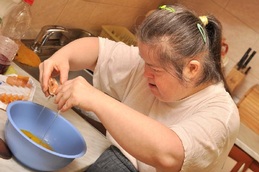Society at risk of 'turning back the clock' on how we approach learning disability and mental health
At times it can be typical to instantly associate the words ‘home care’ with older people, but the lives of younger adults with a learning disability are often equally reliant upon the sector.
Charity Royal Mencap Society is among those anxious that pressures on public services are seeing local councils overlook their commitments to help these adults, after a Freedom of Information request found that 8 out of 10 councils in England and Wales record a housing shortage for individuals with a learning disability.

Its report ‘Housing for people with a learning disability’ also draws information from a survey of 500 parent carers and finds that two-thirds of adults with learning disabilities are not living independently or in supported accommodation.
With 7 out of 10 local authorities also confirming that this situation has worsened over the last 12 months, Mencap believes it is time this issue became a priority and calls for councils to act by implementing ‘action plans at a local level’.
Finding that more and more adults who should be able to live independently are being directed into residential care as the cheaper option, chief executive Mark Goldring is anxious to see that the hard work of the last few decades is not undone.
He comments: “Less than half a century ago, people with a learning disability were locked away and kept a secret from the rest of society. Over recent decades, much progress has been made to ensure that people with a learning disability are able to live independently within their local communities. Councils must not allow short term financial pressures to turn back the clock for people with a learning disability.”
Housing and Support Alliance chief executive Alicia Wood shares similar concerns, commenting in response to the report: “Calls to our advice service about housing have more than doubled in the last year. We continually hear from people with learning disabilities and families who are either being told that there is no housing and no money for them to move on from the family home, or that the only options are residential care or supported housing schemes when neither of these are suitable for individuals.
“We know that with the right housing and support that not only do people with learning disabilities get what they need and thrive, but it is often more cost effective. If we go back to the days of only moving people on in a crisis, not only will there be a greater cost to the public purse but we will see another generation of people with learning disabilities without aspiration and any control over what happens in their lives.”
Hearing that more adults are being moved into residential care unnecessarily remains a sore subject since the abuse that was uncovered by a Panorama investigation at Bristol’s Winterbourne View care home in 2011.

The scandal led to some of the key objectives outlined in the Coalition’s ‘Mid Term Review’ at the start of this year, in which the Government committed itself to: ‘investing £56 million over four years in children and young people with mental health problems to help transform care in light of the scandalous abuse at Winterbourne View hospital’.
Despite this commitment, many still see Government policy as a problem in tackling this issue, particularly in relation to housing benefits.
Chief executive of Barnardo's, Anne Marie Carrie, comments on this, saying: “The reckless proposal to remove housing benefits from under-25s risks leaving some of this country’s most vulnerable young people out in the cold.
“What makes this proposal particularly distasteful is that in reality only a mere eight per cent of total housing benefits are claimed by under-25s, making this a policy which risks causing long-term harm to the lives of young people for the sake of a few headlines.
“The government’s misguided presumption that all young people have parents to help them out or take them in risks leaving the most vulnerable young people without a home.”
Business Secretary Vince Cable acknowledged this very issue when speaking at the opening of a London Care Partnership (LCP) residential home for young adults with autism recently.
Addressing the National Autistic Society, Mr Cable said that “Over the last decade, there has been a big step forwards in the recognition and needs of children with autism, but there has been much less support for adults with the condition who often, as a result, become increasingly isolated and depressed. We need more autism accredited homes”.
Not-for-profit provider Dimensions is one company that has been inspired to campaign on this issue, calling upon supporters to write to their MP and ask they support a ‘new charter’ of rights for people with learning disabilities and autism.
The charter targets five key goals to help get adults more involved with community life, these are: greater independence; more access to public environments; the right to vote and inform decisions; control and choice over relationships and day-to-day support; and a hands-on role with personal budgets.
Chief executive Steve Scown explains: “It is essential that the needs of people with learning disabilities and autism are not marginalised. This charter could not come at a better time, and must serve as an important reminder to policymakers of the fundamental right for people to be involved in decisions that affect their support and quality of life.
“This isn’t just about money – it’s about the need for a widespread change in culture and attitudes to care. There is no point giving someone a personal budget if they then don’t have real choice about their lives and they do not receive a personal service. Every day we see the real difference a personal approach can make to people’s lives. Unfortunately, it’s a postcode lottery at the moment. Many councils are offering old-fashioned ‘we know best’ services. This needs to change.”

A ‘Speak-out’ event was recently held in Warwickshire, organised by home care provider the Hft as part of an initiative to see more people with learning disabilities have their say on community life. The event included forums on recruitment and the use of personalised technology, as well as how to avoid ‘hate and mate crime’.
Strategic implementation director David Hansen said of the speak-out groups: “It’s very important that we know what is the most important to the people we support so that we can make sure we help as many people as possible achieve their potential and give them the support they need.”
Leonard Cheshire Disability chief executive Clare Pelham is frustrated by what she sees as a lack of Government action, in relation both to older people who need care and adults with a disability.
She asks: “What could be more important than providing the essentials of life to disabled and older people? The British public understand that. Many local councils see for themselves the local need on a daily basis. They understand. The experts understand – the economist, Andrew Dilnot, has proposed a thoughtful reform of funding for essential care.
“Is it only the Coalition that does not understand our impatience for action? This cannot go on. It’s time to get a grip. It’s time to stop talking and start doing. We’ve had warm words. Now we need action. Because we all know that actions speak louder than words.”
A group of Conservative MPs recently compiled a collection of essays entitled ‘Making Up Our Minds: Towards Improving Our Approach to Mental Health’, in which Halesowen and Rowley Regis MP James Morris opened by stating that, “The way we deal with mental health in the future will say much about our values as a society.”
Latest Features News
 28-Nov-19
2019 Election: Labour pledges £10.8 bn for free personal care while Boris Johnson sidelines social care
28-Nov-19
2019 Election: Labour pledges £10.8 bn for free personal care while Boris Johnson sidelines social care
 18-Oct-19
Podcast: Wendy Mitchell and dementia: 'My biggest fear is not knowing who my daughters are'
18-Oct-19
Podcast: Wendy Mitchell and dementia: 'My biggest fear is not knowing who my daughters are'
 30-Sep-19
World's oldest diver aged 96 says 'never accept the fact you are getting old'
30-Sep-19
World's oldest diver aged 96 says 'never accept the fact you are getting old'
 27-Sep-19
Exclusive: Care minister backs care workers' call for time off to grieve and attend funerals
27-Sep-19
Exclusive: Care minister backs care workers' call for time off to grieve and attend funerals
 20-Sep-19
Podcast: Gyles Brandreth urges care workers to learn poetry with elderly
20-Sep-19
Podcast: Gyles Brandreth urges care workers to learn poetry with elderly